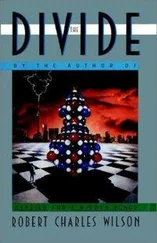He drifted into sleep, a man in a silver bullet train speeding through the dark to an unknown destination. He had the dream again of being the fish; of flashing through the water with fear driving his tail as the visceral tug slowly tore through him. He came awake thumping his head into the seat. The carriage was empty, the train in the station, crowds of passengers pouring past his window.
He went home and watched a movie without taking anything in. He turned off the television and collapsed unfed and unsettled into his bed. He dipped in and out of sleep, not wanting to have the dream again but not wanting to be awake with an anxious world outside his walls. Four o’clock brought him round into a permanent dark wakefulness and he worried about the new chemicals in his brain, which might alter the balance of his mind, while the wooden beams in his vast house groaned like other less fortunate inmates in a distant part of the asylum.
Saturday, 14th April 2001
He got up at 6 a.m. unrested, his nerves jangling like keys on a gaoler’s ring so that he actually started thinking about keys in the house and where they were, the ones that would open his father’s studio. He went to the desk in the study and found a whole drawer full of keys. How could there be so many doors? He took the drawer up to the wrought-iron gate that locked off the part of the gallery in front of his father’s studio. He tried them all, but none of them worked and he walked off, leaving the drawer there on the floor, the keys spread out.
He showered, dressed, went out, bought a newspaper, the ABC, and drank a café solo. He checked the death notices. Raúl Jiménez was being buried today at eleven o’clock in the Cementerio de San Fernando. He drove to the office, checked the voice mail on his mobile, which was all from Ramírez.
There was a full turnout of all six officers from the Grupo de Homicidios, which was not usual for a Saturday before Easter. He briefed them on the outcome of the discussion with Calderón and put Pérez and Fernández into the Feria ground opposite the Edificio Presidente, Baena in the streets around the apartment block, and Serrano on working up a list of laboratories and medical suppliers who might have had an unusual sale of chloroform or missing instruments. The four men left. Ramírez stayed, arms folded, leaning against the window.
‘Any further thoughts, Inspector Jefe?’ he asked.
‘Did we get a statement from Marciano Ruíz?’
Ramírez nodded at the desk, said there was nothing new in it. Falcón read it through only to avoid having to tell Ramírez about his trip to Madrid and the Jiménez family horrors. It had to have more relevance to the murder or Ramírez would start undermining him, and he’d find other officers looking at him sadly as the guy who’d started a murder inquiry by going back to an incident of thirty-six years ago.
‘I went to see Eloisa Gómez yesterday afternoon,’ said Ramírez.
‘Did you get anything out of her?’
‘She didn’t offer me a free blow job, if that’s what you mean.’
‘Not after what you did to her yesterday,’ said Falcón. ‘Did she crack?’
‘She’s not going to talk to me even if she did do it, and now she’s scared.’
‘You were getting on so well,’ said Falcón. ‘I thought you were going to ask her home.’
‘Maybe I should have been more patient,’ said Ramírez. ‘But, you know, I really thought she’d let him in and a hard verbal shock might do the trick.’
‘We’ll start the day with Mudanzas Triana,’ said Falcón, moving along. ‘Then we’ll go to the Jiménez funeral with a video camera and film the mourners. We’ll check those mourners off against the address list and follow up with interviews. We’ll build a picture of his life.’
What about Eloisa Gómez?’
‘Pérez can pull her in again this afternoon. That’ll be nearly forty-eight hours since she was with Raúl Jiménez. If she was an accomplice, the killer will have made contact by then and that might have changed her mental landscape.’
‘Or her entire landscape,’ said Ramírez. ‘For the worse.’
Ramírez picked up the video camera and drove them to Mudanzas Triana, who were on the Avenida Santa Cecilia. They spoke to the boss, Ignacio Bravo, who listened to their theoretical scenario with unmoving eyes behind puffy lids while smoking one Ducados lit from another.
‘First of all, it’s impossible,’ he said. ‘My workers are —’
‘They signed a statement,’ said Ramírez, dead bored, handing it over.
Bravo read the document, flicking ash in the vague direction of a miniature tyre that enclosed an ashtray.
‘They will be fired,’ he said.
‘Talk us through your arrangement with Sr and Sra Jiménez,’ said Falcón. ‘You can start with why they wanted to move during Semana Santa, which must be the busiest time of year for a restaurant.’
‘And not cheap for removals. Our rates double. I explained it all to her, Inspector Jefe. But we couldn’t do it the next week when her restaurants were closed because. we’re all booked up … as is everybody else. So she paid her money. She didn’t care.’
‘When did you first take a look at the job?’
‘I went there last week to see the layout, the quantity of large furniture, the number of packing cases needed, all that stuff. I called her the next day to tell her it would be a two-day job and gave her a quote.’
‘A two-day job?’ said Ramírez. ‘So when did you start?’
‘Tuesday.’
‘Which would make it a three-day job.’
‘Sr Jiménez called to say he didn’t want his study moved until Thursday. I told him it would cost even more than double and that we could do the job in the time. He insisted. I don’t argue the point with rich people; I just make sure they pay. They’re the worst …’
He trailed off when he saw the look from the policemen.
‘How many people knew about the change from the original arrangement?’ asked Falcón.
‘I see what you’re getting at,’ he said, unable to get comfortable. ‘Of course, everybody had to know. It involved changing all the jobs around. You don’t think that one of my men is the murderer?’
‘What’s intriguing us,’ said Falcón, leaving Bravo’s suspicion to hang in the air, ‘is that, if our scenario is correct, the murderer must have known about the change in the arrangement. He must have known that Sr Jiménez was going to stay an extra night and be on his own. He could only know that from Sr Jiménez himself or from here. When did you confirm the job with Sra Jiménez?’
‘Wednesday, 4th April,’ he said, flicking through his diary.
‘When did Sr Jiménez make the change?’
‘Friday, 6th April.’
‘Had you already assigned a work team for the job?’
‘I did that on the Wednesday.’
‘How do you do that?’
‘I call my secretary, who informs the depot foreman, who writes it up on a whiteboard downstairs.’
Falcón asked to speak to the secretary. Bravo called her in: a small, dark nervous woman in her fifties. They asked what she’d said to the foreman.
‘I told him that there’d been a change, that Sr Jiménez didn’t want the study to be touched until Thursday morning and that a small bed should be left in the kids’ room.’
‘What did the foreman say?’
‘The foreman made a coarse remark about what the bed would be used for.’
‘What does he do with that information?’
‘He puts it up on the whiteboard in red to show that it’s a change,’ she said. ‘And he posts the comments about the study and bed in a separate column.’
‘He also types it on to their worksheets,’ said Bravo, ‘so there’s two ways they can’t forget. They’re not very gifted people in the removals business.’
Читать дальше












